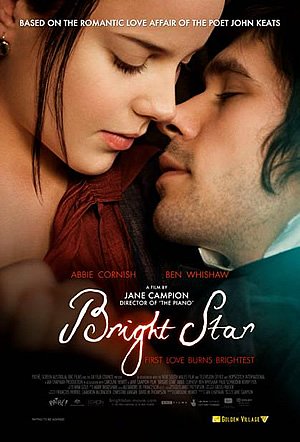Genre: Drama
Director: Jane Campion
Cast: Abbie Cornish, Ben Whishaw, Paul Schneider, Kerry Fox, Roger Ashton-Griffiths, Jonathan Aris, Sebastian Armesto, Samuel Roukin
RunTime: 1 hr 59 mins
Released By: GV
Rating: PG
Official Website: http://www.brightstar-movie.com/
Opening Day: 18 February 2010
Synopsis:
London 1818: a secret love affair begins between 23 year old English poet, John Keats, and the girl next door, Fanny Brawne, an outspoken student of fashion. This unlikely pair started at odds; he thinking her a stylish minx, she unimpressed by literature in general. It was the illness of Keats's younger brother that drew them together. Keats was touched by Fanny's efforts to help and agreed to teach her poetry. By the time Fanny's alarmed mother and Keats's best friend Brown realised their attachment, the relationship had an unstoppable momentum. Intensely and helplessly absorbed in each other, the young lovers were swept into powerful new sensations, "I have the feeling as if I were dissolving", Keats wrote to her. Together they rode a wave of romantic obsession that deepened as their troubles mounted. Only Keats¡¯s illness proved insurmountable.
Movie
Review:
This is one of the rare occasions where I find myself nodding
constantly while watching a film. Not with approval, but with
dread-induced drowsiness.
If
there is an award for Most Nod-worthy Film of 2009, this takes
the cake.
Bright
Star opens with a needle through cloth, moving in, out, in,
out, in, out…
I,
not one with patience for domestic chores, should have heeded
this caveat because it’s oddly prescient of what’s
to come: monotony that feels never-ending.
Even
with film festival darling Jane Campion at the helm, Bright
Star rarely sparkles. In fact, it hardly registers a blip
on the drama-meter. Perhaps the fault lies with the source
material.
Although
celebrated Romantic poet John Keats’ poems may have
captured the imagination of many for decades, the artist and
his love affair neither strikes me as fascinating enough to
be fertile ground for dramatic mining. And it shows glaringly
in the movie. This is despite the best efforts of lanky British
up-and-comer Ben Whishaw to act tormented, ruffled and occasionally
spasmodic, all of which strangely didn’t tug at my heartstrings.
This can be largely due to Campion preferring to waste valuable
screen time on stroking cinematographer’s Greig Fraser
ego for unearthly beautiful cinematography, than helping the
audience get into the enigmatic heart and mind of John Keats.
This
passive role feels like a step-down for Whishaw after having
grabbed cinephiles by the scruff of their necks with his flashy
performances in Brideshead Revisited and Perfume.
Worse,
the movie takes the liberty to transplant quite a number of
Keat’s poems to the big screen by having the protagonists
read them out aloud. They come across as verbose that add
tedium to the movie; they don’t even shed light on the
motivations of the characters. Simply put, if the audience
are interested in Keats’ poems, why would they pay them
get read fleetingly onscreen and not slowly savour them at
their spare time on soft cover?
But
most unforgiveable of all, the movie commits the cardinal
sin of pairing two actors who don’t have any chemistry
at all. Although Abbie Cornish, an Aussie ingénue now
better known as Ryan Philippe’s squeeze, puts her best
foot forward as Fanny Brawne, Keats’ flamboyant and
outspoken lover, she never really convinces me why she would
give all her heart for a boring Joe like Keats. It’s
hard to imagine a strong-willed, self-sufficient and brazen
heroine like her pining for Keats. What is it about Keats
that makes Brawne weak in the knees? We never find out.
The
love affair is nothing you’ve not seen before. You’ve
seen it in bazillion romantic dramas. It’s just repackaged
and regurgitated here to appeal to those who never seem to
get enough of Jane Eyre and Wuthering Heights.
It’s
best summed up here so you can save your money on a more deserving
meal with your date (spoilers
alert).
Girl
from society’s upper crust meets debt-ridden poet and
falls in love. They face objections from family and friends.
Love affair ends in tragedy.
The
saddest thing about the movie is not the tragic ending. It’s
in wondering how a movie that squandered buckets of tears
from the lead actors and that nearly caused me to smack my
gob numerous times while admiring the divine cinematography
could turn out so dramatically inert.
Funny
that watching a Jane Campion movie can make you feel like
you are in a Charlie Kaufman movie. You think you entered
a cinema, but come out thinking you just walked out of a photo
exhibition with an adjunct poetry recital.
Maybe
Bright Star is meant to be a postmodern reading. Hmm. (rubs
chin)
Movie
Rating:
 
(Dull doesn’t even describe this. It’s "duuuuuuuhhhhhllllll")
Review by Adrian Sim
|




